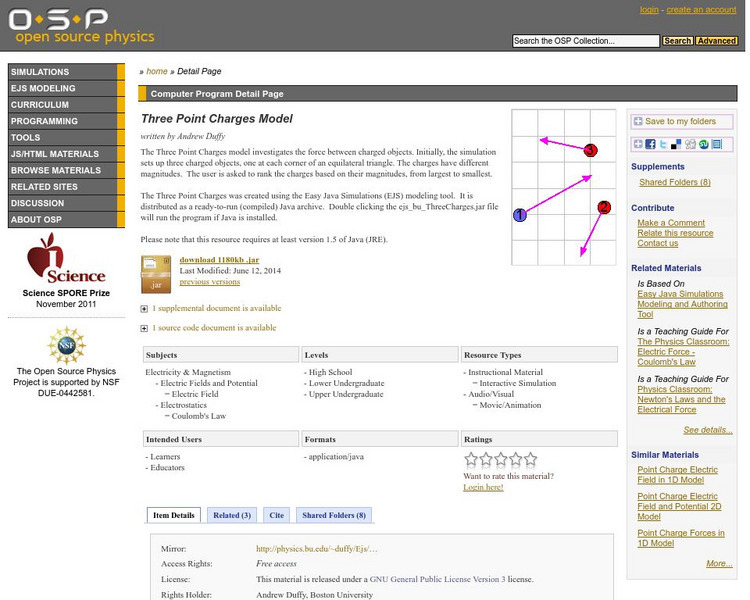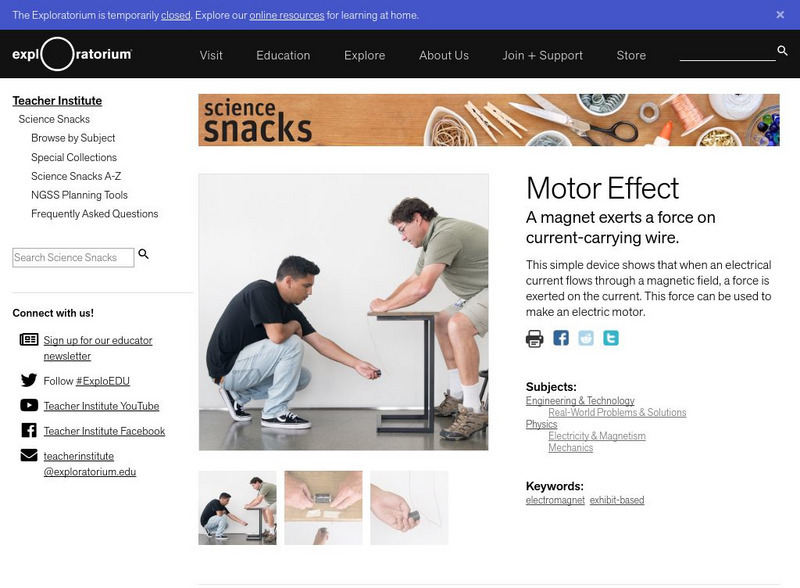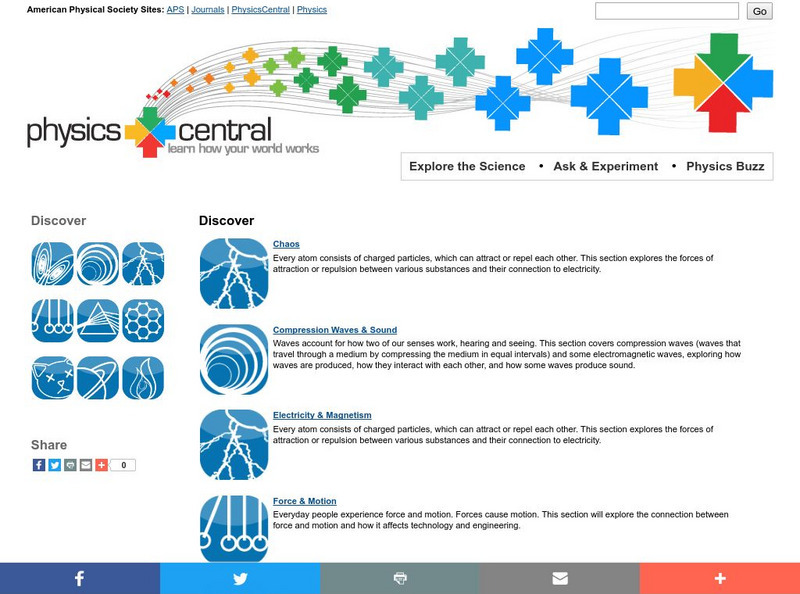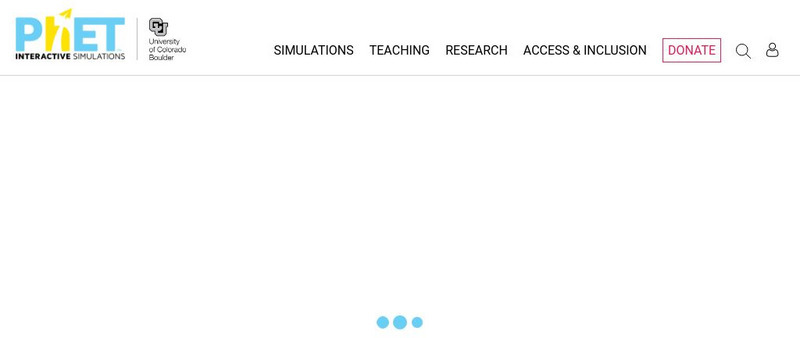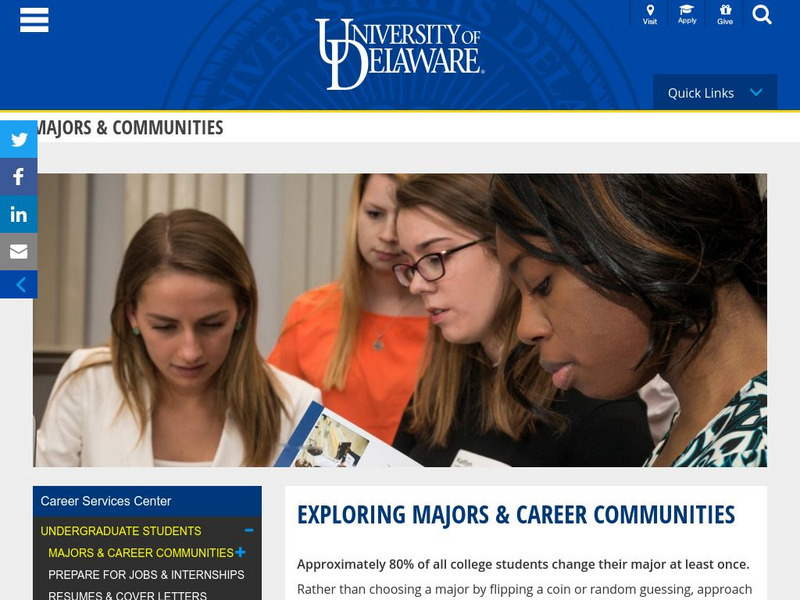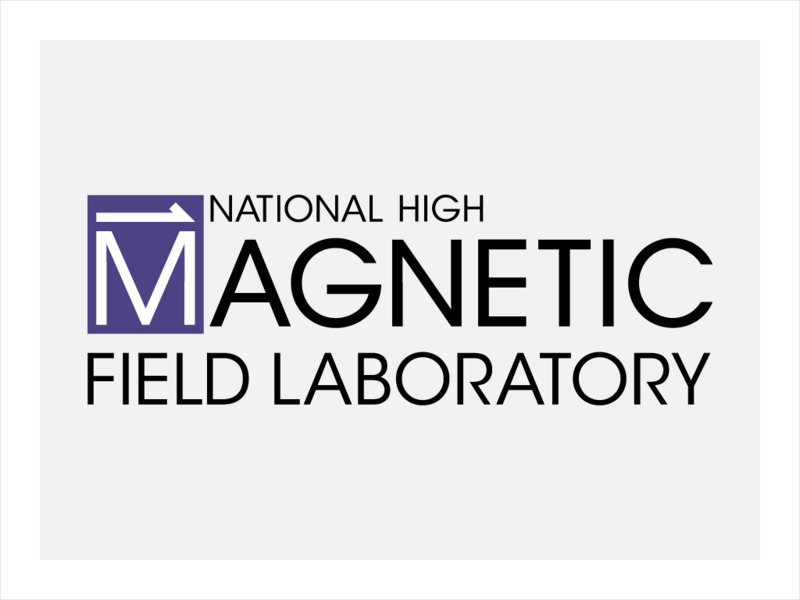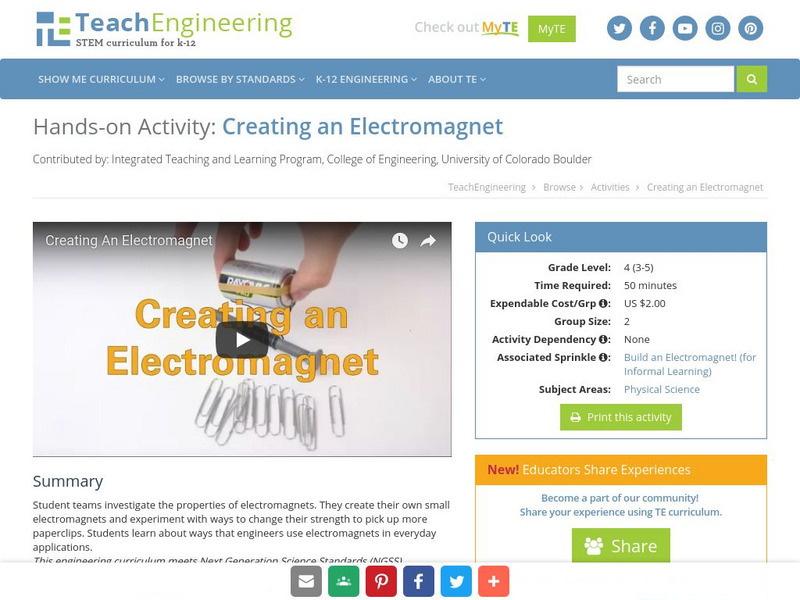Learn Engineering
Learn Engineering: How Does an Induction Motor Work?
An article and video about the most commonly used electrical machine called an induction motor. Learn about the parts of the motors that allow the motor to function. [4:43]
Other
New Talk: Is Nuclear Power Essential to Climate Change and Energy Independence?
New Talk provides an online forum where a panel of non partisan experts in their field discuss relevant domestic issues of today. This discussion focuses on nuclear power, climate change, and energy independence. Readers can comment, but...
American Association of Physics Teachers
Com Padre Digital Library: Open Source Physics: Three Point Charges Model
In this simulation, investigate the force between charged objects. Rank three charged objects of different magnitudes, then create a method to determine the ranking of the charge magnitudes. Finally, devise a new method of determining...
Exploratorium
Exploratorium: Science Snacks: Motor Effect
Create a simple device to see how a force is exerted on a current by a magnetic field. This activity shows how an electric motor can be made with this force.
Khan Academy
Khan Academy: Light: Electromagnetic Waves, Electromagnetic Spectrum and Photons
This article discusses the properties of electromagnetic radiation and photons.
Physics Central
American Physical Society: Physics Central: Discover Homepage
Link to nine major physics topics and dig deeper into the content. Find out about the work of scientists in each field and see example physical science experiments.
University of Colorado
University of Colorado: Ph Et Interactive Simulations: Wave Interference
Conduct virtual experiments with water, sound, and light waves to determine the sine wave and patterns created in each.
Other
University of Delaware: Major Resource Kits
Major Resource Kits link academic majors to career alternatives by providing information on career paths, sample job titles, and a short bibliography of Career Resource Center materials available to students in a particular major....
Physics Aviary
Physics Aviary: Practice Problems: Closest Approach Problem
Find the closest approach between two charges. The charge at the origin is held at rest. The other charge is moving toward the charge with a certain speed and your job is to figure out how close the two charges will get before the moving...
Physics Classroom
The Physics Classroom: Lightning
In this interactive tutorial students will explore what is the cause and mechanism associated with lightning strikes, They will investiage how lightning rods serve to protect buildings from the devastating effects of a lightning strikes....
National High Magnetic Field Laboratory
Magnet Academy: Magnetometer 1832
The Earth, the moon, the stars and just about everything in between has a magnetic field, and scientists use magnetometers when they need to know the strength of those fields.
TeachEngineering
Teach Engineering: Building an Electromagnet
Student teams investigate the properties of electromagnets. They create their own small electromagnet and experiment with ways to change its strength to pick up more paper clips. Students learn about ways that engineers use...
Florida State University
Florida State University: Lightning, a Natural Capacitor
Text and animated graphic show how lightning is an example of a natural capacitor.
Other
Magnet Man: Cool Experiments With Magnets
Here is a lengthy listing of activities and resources pertaining to magnets and magnetism. Experiments which can be performed with many different types of magnets are described; detailed directions and photos are provided.
Concord Consortium
The Concord Consortium: Molecular Workbench: The Hall Effect
Adjust the magnetic field in this simulation to see how the flow of electricity is affected.
Concord Consortium
The Concord Consortium: Molecular Workbench: Lorentz Force 3 D
Adjust the magnetic field intensity and the particle speed in this simulation to observe the affect the movement of the particle.
Cosmo Learning
Cosmo Learning: Faraday's Law
A collection of video lectures covering the topic of Faraday's law taught at East Los Angeles College. In ten lectures, discover how a magnetic field interacts with an electric circuit to produce an electromotive force. Lectures vary in...
University of Colorado
University of Colorado: Physics 2000: Electromagnetic Waves
An excellent site with several pages describing what electromagnetic radiation is.
Concord Consortium
Concord Consortium Where Does the Energy of a Spark Come From?
Activity 3 investigates Why is lightning so much bigger that a spark from the Van de Graff generator? In Activity 3 of this module, students investigate factors that affect the amount of potential energy that is stored.
Concord Consortium
Concord Consortium What Are All Materials Made Of?
Activity of 1 of this module explores Can the same piece of paper be cut into pieces indefinitely? The activity evaluates the particle nature of matter and uses particle nature of matter to explain observations of liquids and gasses.
Concord Consortium
Concord Consortium: What Are Nature's Building Blocks?
Activity 3 of this module investigates: How do we know what's inside an atom? From Ernest Rutherford's Gold Foil Experiment to his investigation of the Plum Pudding model, students become aware of the Nuclear Model of an Atom. Also in...
Concord Consortium
Concord Consortium What Are All Materials Made Of?
Activity 2 of this module explores: Does 5 + 5 always equal 10? In this activity liquids are mixed together and evaluated whether the continuous or particle model of matter provides a better explanation of observations of the behavior of...
Concord Consortium
Concord Consortium What Are Materials Made Of?
Activity 1 in this module explores Can the same piece of paper be cut into pieces indefinitely? The activity evaluates particle nature of matter and uses particle nature of matter to explain observations of liquids and gasses.
Cornell University
Cornell University: Astronomy: Electromagnetism and Charge
This site from Cornell University provides a very short, very telling comparison of matter and charge. This is a good site to check out on the subject, with a chart diagram to help with further information.
Other popular searches
- Electric Field Lines
- Electric Field Force
- Electric Field Mapping
- Electric Field Static
- Radial Electric Field
- Electric Field Vectors
- Science Electric Fields
- Sketch Electric Fields


